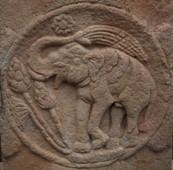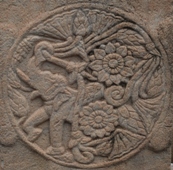our research
Our current research follows two main strands. One is the study of ancient India’s relationship with nature, i.e. vegetation, and non-human animals. To this latter theme refers the PRIN 2022 project “For a Multivocal History of the Attitudes Towards Non-human Animals in South Asia. Ethics, Practices, Symbolism. Investigating New and Unsolved Issues”, presented in collaboration with the Universities of Bologna, Turin, and Venice Ca’ Foscari. Another research strand concerns Vedic studies: its core is the vrātya question and the role of the Atharvavedic collections. Another PRIN 2022 project focuses on these Vedic sources; it is entitled “Entangled Chronotopes: Language, Power, Bodyscapes and Religion in the First Ten Books of the Śaunaka Atharvaveda-Saṃhitā [ŚS]”, and it is carried out in cooperation with the Universities of Cagliari, Pisa, Genova, Roma ‘Sapienza’, and through collaboration with some European Universities working on the Atharvaveda tradition, i.e. Leiden and Zurich.
 The research conducted here, from 1997 to 2014 coordinated by Giuliano Boccali, has long focused in particular on classical Indian literature (kāvya), on its relations with other Indian literary forms, especially the traditional epic, and on the theoretical and aesthetic assumptions of this vast production.
The research conducted here, from 1997 to 2014 coordinated by Giuliano Boccali, has long focused in particular on classical Indian literature (kāvya), on its relations with other Indian literary forms, especially the traditional epic, and on the theoretical and aesthetic assumptions of this vast production. From this period to the present, important research activities are carried out in cooperation with the Indological sections of other international Universities: Institute of Asian Studies, Charles University, Prague, Czech Republic; Department of Languages and Cultures of India & South Asia, Jagiellonian University, Krakow, Poland; Faculty of Oriental Studies, University of Warsaw, Poland; University of Calicut, Kerala, India; Department of Literature, Languages and Cultural Heritage, University of Cagliari. For a complete overview of initiatives and publications of this cooperation since 1998, see the list of joint activities.

In the past, in the early days of the activities of what was then called the Institute of Glottology and Oriental Languages, and which was for a long time directed by Vittore Pisani, research was mainly in the field of comparative Indo-European studies.
After the interlude of Enzo Evangelisti's teaching, in the period 1974-1997 the indological activity was coordinated by Carlo Della Casa; prevailing interests were directed towards Vedic literature, in particular the Upaniṣads, and Jainism. Carlo Della Casa's pupils were scholars such as Fabrizia Baldissera, Alessandro Passi, Cinzia Pieruccini, Paola M. Rossi; while Giuliano Boccali was a student of Vittore Pisani.

